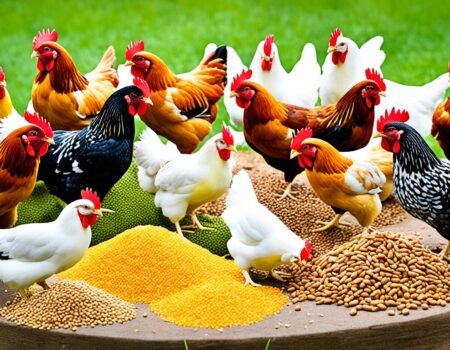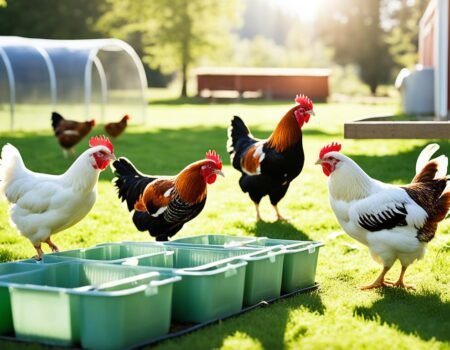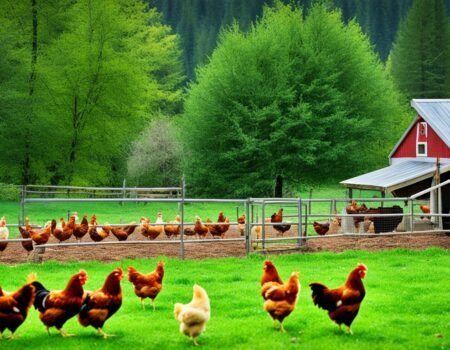Did you know that there are more than 50 billion chickens in the world? That’s right, these amazing birds are one of the most populous species on our planet. Whether you’re a backyard chicken enthusiast or a farmer, proper chicken care is crucial for maintaining the health and well-being of your flock. From providing the right diet to ensuring a safe and clean environment, there are several essential tips to keep in mind.
Key Takeaways:
- Implement biosecurity practices to protect your flock from diseases.
- Maintain a dry and clean coop to support respiratory health.
- Provide clean and continuous water supply to keep chickens hydrated.
- Choose feed with ideal nutrition for each life stage of chickens.
- Manage broody hen behavior to prevent potential health issues.
Implement Biosecurity Practices
Biosecurity practices are essential in maintaining the health and safety of your chicken flock. By implementing proper measures, you can protect your chickens from various diseases and ensure their overall well-being. Understanding the top chicken diseases and the associated biosecurity practices is crucial for the successful management of your flock.
Chicken diseases can spread quickly and pose serious threats to the entire flock. Therefore, it is important to be proactive in preventing and controlling these diseases through biosecurity measures. These practices involve establishing procedures that minimize the risk of introducing pathogens to your flock and preventing their spread.
One of the first steps in biosecurity is to limit contact between your chickens and potential sources of infection. This can be achieved by restricting access to visitors, equipment, and other animals that may carry diseases. It is also important to maintain strict hygiene standards, such as regularly disinfecting equipment and maintaining clean and dry living quarters for your chickens.
Another crucial aspect of biosecurity is monitoring and early detection of diseases. By closely observing your flock and regularly checking for signs of illness, you can intervene early and prevent the spread of diseases. Familiarize yourself with the common symptoms of chicken diseases, such as respiratory issues, changes in behavior, or abnormal egg production.
Top Chicken Diseases and Biosecurity Measures
Here are some of the most common chicken diseases and the corresponding biosecurity measures to help you protect your flock:
| Chicken Disease | Biosecurity Measures |
|---|---|
| Marek’s Disease | Strict biosecurity protocols, vaccination* |
| Infectious Bronchitis | Biosecurity measures to prevent contact with infected birds, vaccination* |
| Avian Influenza | Strict biosecurity protocols, isolation of sick birds, biocontainment measures |
| Coccidiosis | Clean and dry living conditions, proper sanitation, medicated feed* |
| Fowl Cholera | Biosecurity measures to prevent contact with infected birds, vaccination* |
*Consult with a veterinarian for guidance on vaccinations and medication.
By implementing biosecurity practices and being vigilant in disease prevention, you can provide a safe and healthy environment for your flock. Remember to regularly evaluate and update your biosecurity protocols to adapt to new challenges and developments.
Maintain a Dry and Clean Coop
A clean and dry coop is vital for the overall health and well-being of your chickens. Regular maintenance and proper cleaning practices are essential to prevent the growth of harmful bacteria and maintain optimal respiratory health for your flock.
Moisture in the coop can create a breeding ground for bacteria and increase the risk of respiratory infections in chickens. Wet bedding, accumulated droppings, and stagnant water can lead to the growth of harmful pathogens that can compromise the respiratory health of your chickens.
Here are some important tips for maintaining a clean and dry coop:
- Regularly remove wet bedding and soiled litter to prevent moisture buildup.
- Ensure proper ventilation in the coop to minimize humidity levels.
- Inspect the coop for any leaks or areas where water may enter.
- Provide adequate drainage in the outdoor run area to prevent water accumulation.
By implementing these practices, you can create a clean and dry environment that promotes good respiratory health for your chickens.
“A clean and dry coop is essential for maintaining a healthy environment for your flock. Regular cleaning and removal of wet bedding and droppings are crucial for preventing the growth of harmful bacteria and ensuring optimal respiratory health.”
Remember, a clean and dry coop not only promotes respiratory health but also contributes to overall flock hygiene. It is important to establish a regular cleaning routine to keep your chickens healthy and happy.
| Benefits of a Clean and Dry Coop | Risks of a Wet Coop |
|---|---|
| Minimizes the risk of bacterial and fungal infections | Increases the chances of respiratory diseases |
| Creates a healthier environment for chickens | Promotes the growth of harmful bacteria |
| Reduces odor and ammonia levels | Attracts pests and parasites |
Provide Clean Water Supply 24/7
Ensuring a clean water supply is crucial for the overall health and well-being of your flock. Clean water helps maintain hydration, supports digestion, and plays a vital role in regulating body temperature. It is essential to provide chickens with access to clean, fresh water at all times.
One effective way to provide a continuous supply of clean water is by using poultry nipple waterers. These specialized waterers are designed with small, nipple-like valves that release water when chickens peck at them. This not only prevents water contamination but also reduces the risk of bacterial infections.
Poultry nipple waterers offer several advantages over traditional waterers. They help keep the water clean and free from debris, preventing bacterial contamination. Additionally, the design of these waterers minimizes wastage, as chickens cannot easily spill or soil the water. This ensures that your flock has access to clean, uncontaminated water throughout the day.
Regularly inspect the nipple waterers to ensure they are functioning properly and not clogged. Clean and sanitize the waterers on a regular basis to prevent the buildup of bacteria, algae, or other impurities. This will help maintain the cleanliness of the water supply and promote the health of your chickens.
By providing a 24/7 clean water supply with the use of poultry nipple waterers, you are taking an important step in ensuring the well-being of your flock. Clean water is vital for their overall health, proper hydration, and the prevention of bacterial contamination.
Choose Feed with Ideal Nutrition
Providing chickens with the right nutrition is crucial for their overall health and well-being. Each life stage of chickens, from chick to adult, has specific dietary requirements that need to be met for optimal growth, egg production, and overall vitality. To ensure that your chickens receive the ideal nutrition, it is recommended to consult with poultry specialists or knowledgeable feed store personnel who can guide you in selecting the right feed for your flock.
By seeking advice from feed specialists, you can receive tailored recommendations based on your chickens’ specific needs, including their age, breed, and purpose. These experts understand the importance of balanced and complete nutrition and can help you choose feeds that contain the necessary vitamins, minerals, and protein levels suitable for your chickens.
Here is a table summarizing the nutritional needs of chickens at different life stages:
| Life Stage | Nutritional Requirements |
|---|---|
| Chicks (0-6 weeks) | Higher protein levels (around 20-24%), balanced amino acids, vitamins, and minerals for proper growth and development. |
| Growers (6-20 weeks) | Gradually decreasing protein levels (around 16-18%), balanced amino acids, vitamins, and minerals for continued growth and feather development. |
| Layers (20+ weeks) | Lower protein levels (around 16%), increased calcium for strong eggshells, proper vitamin and mineral ratios for egg production. |
Choosing feed that meets these specific nutritional requirements will ensure that your chickens thrive and maintain optimum health. It is important to follow the feeding recommendations provided by the feed specialists and to monitor your chickens’ growth and condition regularly.
Remember, providing optimal nutrition is key to promoting stronger immune systems, healthier feathers, better egg quality, and overall flock vitality. So, consult with feed specialists or knowledgeable professionals to give your chickens the ideal nutrition they need for optimal health and productivity.
Manage Broody Hen Behavior
Broody hens, known for their intense desire to nest and sit on eggs even when they are infertile or non-existent, can develop broody behavior that may affect their health over time. It is important to manage broodiness in hens to prevent potential health issues and ensure their overall well-being.
Some chicken breeds are more prone to broodiness than others. For example, heritage breeds like Orpingtons and Cochins tend to exhibit broody behavior more frequently compared to commercial hybrid breeds known for their high egg production.
The Dangers of Broody Behavior
While broody behavior is a natural instinct in hens, it can lead to certain risks if not managed properly. Broody hens may refuse to leave the nest, causing them to eat less, drink less, and even lose weight. They may also become more susceptible to parasitic infections and develop feather loss due to increased time spent sitting. Additionally, their constant sitting can lead to reproductive issues, such as egg binding.
A broody hen can cause harm to herself and the flock if her behavior is not managed effectively.
Here are a few strategies to manage broody behavior in hens:
- Interrupt the Nesting Process: Gently remove broody hens from the nest and place them in a separate area with no nesting material. This will break their cycle and discourage their brooding behavior. Ensure that the area where you relocate them has good ventilation and is comfortable.
- Discourage Nesting Habits: Remove any potential nest spaces or place dummy eggs in the nests to discourage hens from sitting. Limit access to dark, secluded areas where they might be tempted to build a nest.
- Provide Environmental Enrichment: Engage broody hens in activities that keep them active and distracted. Provide them with a dust bath area, fresh treats, and extra space for exercise to help redirect their energy.
Broody Hen Management Table
| Broody Hen Management Strategies | Effectiveness | Difficulty Level |
|---|---|---|
| Interrupting the nesting process | High | Low |
| Discouraging nesting habits | Moderate | Medium |
| Providing environmental enrichment | High | Low |
| Setting up a separate broody coop | High | Medium |
Managing broody hen behavior requires consistent efforts and patience. By implementing these strategies, you can help your broody hens return to their normal routine and ensure their long-term health within the flock.
Check Droppings Daily
Regularly monitoring droppings is an important aspect of chicken health management. By observing the appearance, texture, and color of their droppings, we can gather valuable insights into their overall well-being and detect potential health problems at an early stage. Early treatment can make a significant difference in preventing or minimizing the impact of health issues.
Monitoring droppings:
- Allows us to assess the digestive health of our chickens
- Provides clues about nutrient absorption and potential dietary imbalances
- Enables us to identify signs of parasites, such as worms
- Alerts us to the presence of infections or diseases
Regularly checking droppings also helps us maintain a clean and hygienic environment for our flock, reducing the risk of diseases and supporting their overall well-being. If you notice any abnormalities in the appearance, texture, or color, it is essential to take prompt action and seek appropriate veterinary advice if necessary.
“Regularly checking droppings allows us to identify potential health problems in chickens and provides an opportunity for early treatment.”
Observing Dropping Characteristics
When assessing droppings, pay attention to the following characteristics:
- Consistency: Normal droppings should be well-formed, moist, and easily breakable. Loose or watery droppings may indicate digestive issues or infections.
- Color: Healthy droppings should have a brownish color. Changes in color, such as green, yellow, or black, may indicate liver or intestinal problems.
- Texture: Normal droppings should have a balanced texture, neither too firm nor too loose. Extremely hard or excessively runny droppings may point to underlying health concerns.
By conducting regular droppings checks, we can stay proactive in addressing any potential health problems and ensure early treatment. It is important to keep in mind that changes in droppings can be indicative of various health issues. Therefore, it is always best to consult with a poultry veterinarian or an experienced chicken keeper for accurate diagnosis and guidance.
Offer a Dust Bath Location
To maintain healthy skin and feathers, it’s important to provide chickens with a designated dust bath area. Dust bathing is a natural behavior that allows chickens to clean themselves and keep their feathers in optimal condition.
Chickens need access to areas where they can dig and bathe in dry dirt or sand. The dust bath helps remove excess oil, parasites, and dead skin cells from their feathers, promoting a clean and healthy coat. Additionally, dust bathing helps to prevent mites and other external parasites from infesting the flock.
Creating a dust bath area is easy and doesn’t require much space. Simply find a corner of your chicken coop or outdoor run and fill it with fine sand or dry dirt. Add a generous amount of organic material, such as dried herbs or wood ash, to enhance the dust bath experience. This will also help control any odors and provide additional benefits for your flock’s overall health.
Encourage your chickens to use the dust bath area by sprinkling some feed or treats in the designated spot. They will quickly learn to associate this area with relaxation and grooming, making it their go-to place for feather and skin cleansing.
Remember to regularly replenish the dust bath area with fresh dirt or sand as needed. This will ensure that your chickens have a clean and inviting place to take their dust baths.
By providing a dust bath location, you are not only promoting good hygiene for your chickens but also offering them a natural and enjoyable activity. So, give your flock the opportunity to indulge in a comforting dust bath and watch them thrive with healthy skin and radiant feathers.
Provide Adequate Coop Ventilation
Fresh and clean air circulation in the chicken coop is crucial for maintaining the respiratory health of the flock. Adequate coop ventilation plays a vital role in preventing respiratory infections and ensuring the overall well-being of your chickens.
When the coop lacks proper ventilation, it can lead to the buildup of ammonia, dust, and moisture, which can have detrimental effects on chicken health. These harmful elements can cause respiratory problems, such as respiratory infections, coughing, wheezing, and difficulty breathing.
To maintain optimal coop ventilation, consider the following:
- Install windows or vents: Provide openings in the coop that can be opened or closed to regulate airflow. This allows for fresh air to enter and stale air to exit the coop.
- Position vents strategically: Place vents near the top and bottom of the coop to facilitate proper air circulation.
- Avoid drafts: While ventilation is important, it’s essential to strike a balance and prevent drafts, as they can lead to stress and respiratory issues in chickens. Ensure vents are placed away from direct drafts.
- Keep bedding dry: Regularly clean and replace bedding to prevent moisture buildup, which can contribute to respiratory problems. Use absorbent materials, such as straw or wood shavings.
- Regular air quality checks: Monitor the ammonia levels in the coop by using ammonia detection devices or simply observing the presence of strong odors. If ammonia levels are high, increase ventilation and reduce sources of moisture and waste buildup.
Remember, maintaining proper coop ventilation is as crucial as providing food and water for your chickens. By prioritizing fresh air circulation, you can significantly reduce the risk of respiratory infections and promote the overall health of your flock.
| Benefits of Adequate Coop Ventilation | Consequences of Poor Ventilation |
|---|---|
|
|
Proper coop ventilation is essential for maintaining a healthy and thriving flock. Take the necessary steps to ensure your chickens have access to fresh, clean air, and you’ll be rewarded with healthier and happier chickens.
Provide a Safe and Secure Coop and Outdoor Run
A well-ventilated, draft-free, and dry coop is essential for the health and safety of our chickens. The coop should have enough space for them to move around comfortably and include nest boxes and roosting areas. This ensures that they have a safe and secure place to rest, lay eggs, and sleep.
In addition to a well-designed coop, it’s important to provide an outdoor run for our flock. An outdoor run allows chickens to exercise and engage in natural behaviors such as foraging and scratching the ground. This helps keep them physically active and mentally stimulated, contributing to their overall well-being.
Having access to an outdoor run also gives chickens the opportunity to get fresh air and exposure to natural sunlight. This helps boost their immune system and supports healthy feather growth. It’s important to ensure that the outdoor area is securely enclosed to protect the flock from predators and prevent them from wandering off.
By providing a safe and secure coop and outdoor run, we are not only ensuring the physical health and safety of our chickens but also promoting their natural behaviors and overall happiness. It’s our responsibility to create an environment that allows them to thrive and live their best lives on our backyard farm.
FAQ
What are some essential chicken care tips for a healthy flock?
Some essential chicken care tips include implementing biosecurity practices, maintaining a dry and clean coop, providing a clean and continuous water supply, choosing feed with ideal nutrition, managing broody hen behavior, checking droppings daily, offering a dust bath location, providing adequate coop ventilation, and ensuring a safe and secure coop and outdoor run.
Why are biosecurity practices important for chickens?
Implementing biosecurity practices is important for keeping chickens free from diseases. Knowing the top chicken diseases and their associated biosecurity measures is crucial for maintaining a healthy flock.
How does maintaining a dry and clean coop benefit chicken health?
Keeping the chicken coop dry and clean prevents the growth of harmful bacteria and supports the respiratory health of the chickens. Regular cleaning and removal of droppings is essential for maintaining a healthy environment.
Why is a clean water supply important for chickens?
Clean water is important for the health of chickens. Using poultry nipple waterers helps provide continuous access to clean water and reduces the risk of bacterial contamination.
How can I ensure my chickens receive ideal nutrition?
Each life stage of chickens requires different nutritional needs. Consulting with a poultry specialist or feed store can help ensure that chickens receive the ideal nutrition for optimal health.
How can I manage broody hen behavior?
Broody hens that sit on infertile eggs or an empty nest need to have their brooding behavior managed to prevent potential health issues. Some chicken breeds are more prone to broodiness than others.
Why is checking droppings daily important?
Regularly checking the appearance, texture, and color of chicken droppings can help identify any potential health problems and allows for early treatment.
Why is offering a dust bath location important for chickens?
Providing a dust bath area for chickens is important for maintaining healthy skin and feathers. Chickens need access to areas where they can dig and bathe in dry dirt or sand.
How does adequate coop ventilation contribute to chicken health?
Fresh and clean air circulation in the chicken coop helps prevent respiratory infections. Proper coop ventilation is essential for the overall health of the flock.
Why is a safe and secure coop and outdoor run important for chickens?
A well-ventilated, draft-free, and dry coop, with adequate space for movement and the inclusion of nest boxes and roosting areas, is vital for the health and safety of chickens. Access to an outdoor run allows for exercise and foraging, contributing to the overall flock health.











No Comment! Be the first one.